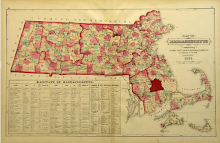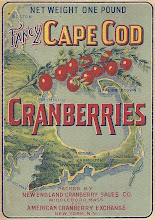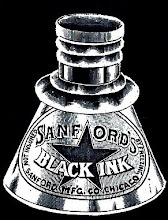
Though employees of the
Lakeville State Sanatorium and many local residents may have held fond recollections of the state tubercular hospital, an equal number of patients treated there probably recalled their days in Lakeville less favorably, and for many the duration of their stay was frequently plagued by bouts of loneliness. Most were far from family and friends whom they saw only infrequently. Coupled with the rigors of their treatment (patients were out of doors in all but the wettest of weather) and the uncertainty of their fate (in a landmark 1940 study of 63 Lakeville Sanatorium children with tuberculosis of the spine, only 60% survived), the loneliness many felt was but another aspect of their stay.

While many picture postcards survive from the era to document the physical appearance of the institution, what is often overlooked is the reverse of these cards with their handwritten messages which frequently record the emotional state of the patients who wrote them. It is these brief messages written long ago by now forgotten patients which help give a poignant glimpse into the world inside the San. In late 1915, one such patient known to history only as Ray wrote to Miss Ethel Small of Somerville informing her that he was “feeling fine but near froze to death.” It is likely that he had been wheeled in one of the iron beds onto the veranda or the semi-enclosed pavilion for therapy, despite the frigid November weather. Olof experienced the sanatorium at a much pleasanter time of year. Writing to his nephew Ted Nelson at Atlantic in March, 1913, "Uncle Olof" was apparently overwhelmed at the natural setting in which he found himself, one which had initially attracted the state's attention when searching for a suitable site on which to erect the sanatorium. “Nice place here Ted: Bull Frogs is singing all night & the Robins in the morning won’t leave us sleep.” The postcard which Maud Lapham sent her friend, Mrs. Mary A. Howard of Randolph, however, was more revealing and spoke in September, 1911, of the difficulty of being alone in unfamiliar surroundings. “Dear Friend – Thank you very much for [your] card and wishes. I had as pleasant a time as I could among strangers. In the evening the nurses all came in and Mrs. Kelly (the matron) as guest of honor. She is a lovely woman.” In a similar vein, Rose who had recovered sufficiently to “be up” c
onfided to Lucy Webster of Taunton, in April, 1915: “Am getting more used to my surroundings but there is no place like home to me” and she urged Miss Webster “Come over when you can”.

Without question, the most telling account of the Lakeville State Sanatorium from a patient’s perspective is
The Baby’s Cross by C. Gale Perkins (2003) which chronicles the 12 years the author spent as a child in the institution between 1936 and 1948. Her story is one of great fortitude and perserverance in the face of adversity, and it undoubtedly captures many of the emotions and experiences of the patients who once sought treatment at Lakeville. Visit her webiste at
http://ervharmon.com/thebabyscrossbycgaleperkins for more information, links to photographs and videos of her talks and the sanatorium, or to purchase her book.
j
Top: "Lakeville State Sanatarium [sic], Middleboro, Mass.", H. A. Dickerman & Son, Taunton, MA, c. 1910, postcard.
The view depicts the side of one of the two adult ward buildings which were identical. It was on this card which the patient known only as Rose wrote Lucy Webster in April, 1915. "Come over when you can," it urged.
Middle: Reverse of the same postcard showing the complete message in pencil written by Rose. Hundreds of these cards were undoubtedly sent monthly to loved ones, relatives and friends, recording not only the physical but the emotional state of sanatorium patients.
 Though employees of the Lakeville State Sanatorium and many local residents may have held fond recollections of the state tubercular hospital, an equal number of patients treated there probably recalled their days in Lakeville less favorably, and for many the duration of their stay was frequently plagued by bouts of loneliness. Most were far from family and friends whom they saw only infrequently. Coupled with the rigors of their treatment (patients were out of doors in all but the wettest of weather) and the uncertainty of their fate (in a landmark 1940 study of 63 Lakeville Sanatorium children with tuberculosis of the spine, only 60% survived), the loneliness many felt was but another aspect of their stay.
Though employees of the Lakeville State Sanatorium and many local residents may have held fond recollections of the state tubercular hospital, an equal number of patients treated there probably recalled their days in Lakeville less favorably, and for many the duration of their stay was frequently plagued by bouts of loneliness. Most were far from family and friends whom they saw only infrequently. Coupled with the rigors of their treatment (patients were out of doors in all but the wettest of weather) and the uncertainty of their fate (in a landmark 1940 study of 63 Lakeville Sanatorium children with tuberculosis of the spine, only 60% survived), the loneliness many felt was but another aspect of their stay. While many picture postcards survive from the era to document the physical appearance of the institution, what is often overlooked is the reverse of these cards with their handwritten messages which frequently record the emotional state of the patients who wrote them. It is these brief messages written long ago by now forgotten patients which help give a poignant glimpse into the world inside the San. In late 1915, one such patient known to history only as Ray wrote to Miss Ethel Small of Somerville informing her that he was “feeling fine but near froze to death.” It is likely that he had been wheeled in one of the iron beds onto the veranda or the semi-enclosed pavilion for therapy, despite the frigid November weather. Olof experienced the sanatorium at a much pleasanter time of year. Writing to his nephew Ted Nelson at Atlantic in March, 1913, "Uncle Olof" was apparently overwhelmed at the natural setting in which he found himself, one which had initially attracted the state's attention when searching for a suitable site on which to erect the sanatorium. “Nice place here Ted: Bull Frogs is singing all night & the Robins in the morning won’t leave us sleep.” The postcard which Maud Lapham sent her friend, Mrs. Mary A. Howard of Randolph, however, was more revealing and spoke in September, 1911, of the difficulty of being alone in unfamiliar surroundings. “Dear Friend – Thank you very much for [your] card and wishes. I had as pleasant a time as I could among strangers. In the evening the nurses all came in and Mrs. Kelly (the matron) as guest of honor. She is a lovely woman.” In a similar vein, Rose who had recovered sufficiently to “be up” confided to Lucy Webster of Taunton, in April, 1915: “Am getting more used to my surroundings but there is no place like home to me” and she urged Miss Webster “Come over when you can”.
While many picture postcards survive from the era to document the physical appearance of the institution, what is often overlooked is the reverse of these cards with their handwritten messages which frequently record the emotional state of the patients who wrote them. It is these brief messages written long ago by now forgotten patients which help give a poignant glimpse into the world inside the San. In late 1915, one such patient known to history only as Ray wrote to Miss Ethel Small of Somerville informing her that he was “feeling fine but near froze to death.” It is likely that he had been wheeled in one of the iron beds onto the veranda or the semi-enclosed pavilion for therapy, despite the frigid November weather. Olof experienced the sanatorium at a much pleasanter time of year. Writing to his nephew Ted Nelson at Atlantic in March, 1913, "Uncle Olof" was apparently overwhelmed at the natural setting in which he found himself, one which had initially attracted the state's attention when searching for a suitable site on which to erect the sanatorium. “Nice place here Ted: Bull Frogs is singing all night & the Robins in the morning won’t leave us sleep.” The postcard which Maud Lapham sent her friend, Mrs. Mary A. Howard of Randolph, however, was more revealing and spoke in September, 1911, of the difficulty of being alone in unfamiliar surroundings. “Dear Friend – Thank you very much for [your] card and wishes. I had as pleasant a time as I could among strangers. In the evening the nurses all came in and Mrs. Kelly (the matron) as guest of honor. She is a lovely woman.” In a similar vein, Rose who had recovered sufficiently to “be up” confided to Lucy Webster of Taunton, in April, 1915: “Am getting more used to my surroundings but there is no place like home to me” and she urged Miss Webster “Come over when you can”. Without question, the most telling account of the Lakeville State Sanatorium from a patient’s perspective is The Baby’s Cross by C. Gale Perkins (2003) which chronicles the 12 years the author spent as a child in the institution between 1936 and 1948. Her story is one of great fortitude and perserverance in the face of adversity, and it undoubtedly captures many of the emotions and experiences of the patients who once sought treatment at Lakeville. Visit her webiste at http://ervharmon.com/thebabyscrossbycgaleperkins for more information, links to photographs and videos of her talks and the sanatorium, or to purchase her book.
Without question, the most telling account of the Lakeville State Sanatorium from a patient’s perspective is The Baby’s Cross by C. Gale Perkins (2003) which chronicles the 12 years the author spent as a child in the institution between 1936 and 1948. Her story is one of great fortitude and perserverance in the face of adversity, and it undoubtedly captures many of the emotions and experiences of the patients who once sought treatment at Lakeville. Visit her webiste at http://ervharmon.com/thebabyscrossbycgaleperkins for more information, links to photographs and videos of her talks and the sanatorium, or to purchase her book. 





















+of+Smoky+Mountains+018.jpg)
2 comments:
Many of us have quietly enjoyed your articles in the Gazette that have added to our understanding of the history of our adopted home. Your articles have allowed us to appreciate the rich history and to find many of the important historical places around the area.
Several years ago, you were helpful in directing me to additional resources to research my property's ownership in terms of the "Indian Purchase" which was the "Eight Men's Purchase" and you were a treasure trove of information.
I, for one, look forward to reading what you write! Thank you for provide this wealth of information and making it available to a wider audience as a resource.
Jessie
This is the best site!
Post a Comment